The narrative of a “free and open Indo-Pacific” has been instrumental in shaping the foreign policies of many countries that compose this geostrategic realm set across maritime Asia. At the heart of the Indo-Pacific lies the Bay of Bengal—an inter-regional arena, situated at the confluence of the Indian and Pacific Oceans and fringed by countries of both South and Southeast Asia. The Bay is home to a fabled wealth of vast hydrocarbon reserves and hosts shipping routes—vital for trade in oil and natural gas. In a future riddled with uncertainty over energy, the lure of the Bay is undeniable to its littorals as well as extra-regional states. The arrival of major powers coupled with the keenness of the littorals to engage in these waters has transformed the Bay into a stage for a strategic power play. The Bay’s growing significance has also shed light on the non-traditional challenges prevailing in this region, such as climate change and illegal fishing, which demand collaborative attention. As such collective concerns emerge as avenues of cooperation, developmental partnerships in trade, connectivity and blue economy are also the need of the hour, for a more integrated region. To explore these dynamics of an evolving Bay of Bengal against the broad canvas of the Indo-Pacific, the Observer Research Foundation (ORF) in collaboration with the Government of Japan, organised an International Conference entitled “Situating the Bay of Bengal in a Free and Open Indo-Pacific,” on 3 and 4 November 2022.
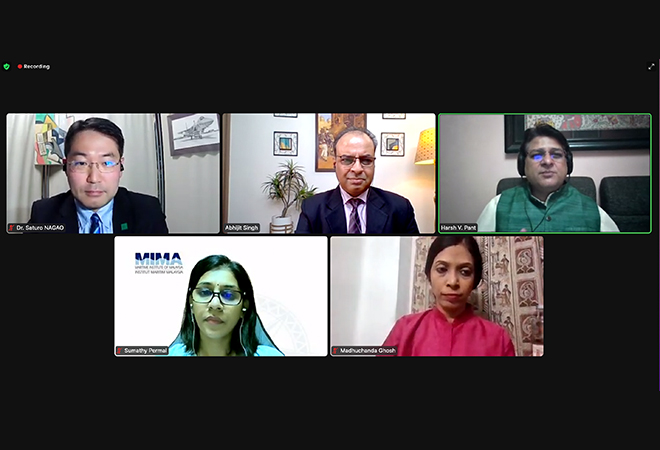
Keeping in mind the multi-dimensional dynamics unfolding in the Bay of Bengal, the conference was divided into four digital Business Sessions: on ‘Rewiring Connectivity for a Bay of Bengal Community,’ ‘Localising Globalisation in the Bay of Bengal’, ‘Securing the Bay: Awareness, Arrangements, Action’ and ‘Blue Economy in the Bay of Bengal: Riding the Waves of sustainability’. The inaugural session of the conference was held in hybrid mode at Hyatt Regency, Kolkata featuring noted dignitaries. The session was chaired by Nilanjan Ghosh, Director, Center for New Economic Diplomacy and ORF Kolkata, India and Anasua Basu Ray Chaudhury Senior Fellow, ORF, India, who introduced the theme of the Conference. The inaugural address was delivered by His Excellency Koichi Nakagawa, Consul-General, Consulate General of Japan in Kolkata, focusing on Japan’s vision of a ‘Free and Open Indo-Pacific’. He pointed out that Japan was keen to establish long-lasting partnerships in the region and enhance connectivity amongst the Bay of Bengal littoral states. The inaugural session featured two special addresses, by Rudrendra Tandon, Additional Secretary, BIMSTEC & SAARC Division, Ministry of External Affairs, Government of India and by Tariq Karim (Amb. Retd.), Director, Centre for Bay of Bengal Studies at Independent University, Bangladesh. While Mr Tandon highlighted the significance of the new BIMSTEC charter in fostering economic and regional development, Ambassador Karim focused on the historical significance of the Bay of Bengal. The keynote address was delivered by Masahiro Kawai, Distinguished Research Fellow, The Japan Forum on International Relations and Professor Emeritus, The University of Tokyo, Japan. He narrated that India, with its substantial economic potential (FOIP) and significance, can play an important role in strengthening the ‘Free and Open Indo-Pacific’ construct within its immediate neighbourhood and Japan can lend crucial support.
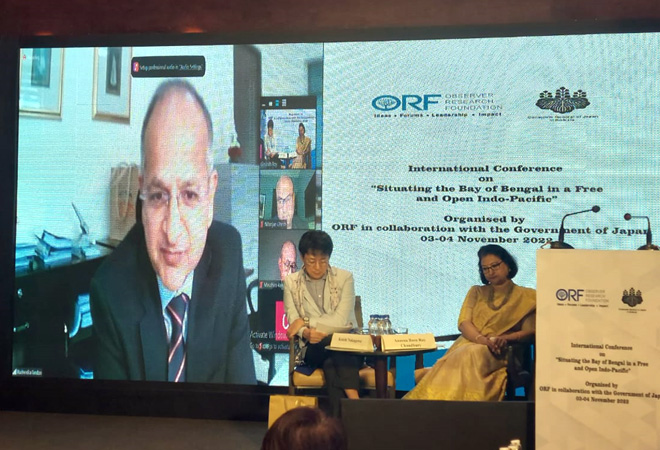
The deliberations of the inaugural address set the stage for the business sessions that were held subsequently, featuring academicians, diplomats, researchers, and other stakeholders. Business Session 1 on ‘Rewiring Connectivity for the Bay of Bengal, was chaired by Anasua Basu Ray Chaudhury and the Speakers were Delwar Hossain, Professor of International Relations and Director, East Asia Center, University of Dhaka, Bangladesh; Jun Watanabe, Senior Representative, JICA India Office, India; and Constantino Xavier, Fellow at the Centre for Social and Economic Progress, India. A special address adjoining the session was delivered by Sabyasachi Dutta, Executive Director, Asian Confluence, India. In the deliberations, it was put forth that India’s Act East Policy and Japan’s increasing focus on FOIP should be led by improvements in cross-border connectivity contributing significantly to ease of logistics and greater economic integration. ‘6Cs’—Coordination, Cooperation, Community, Connectivity, Commitment, and Confidence—were deemed to be critical for the region. In an interesting take, the session while discussing the various forms of physical connectivity, also concentrated on the importance of psychological connectivity as a way of nurturing a sense of community. The idea of people-to-people connectivity, its scope and implications are also critical to conceptualising the broader frameworks of regional cooperation and strengthening its focus.
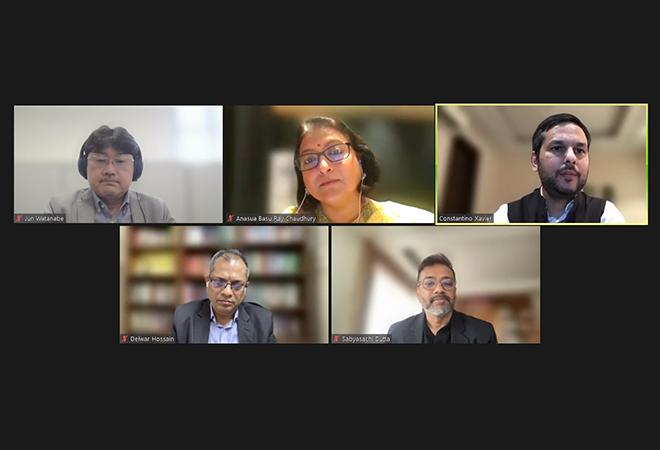
From connectivity to trade, the second business session on “Localising Globalization in the Bay of Bengal,” was chaired by Nilanjan Ghosh and the special address was delivered by Takashi Suzuki, Chief Director General, JETRO India, India. Speakers were Anirban Sarma, Senior Fellow, ORF, India; Piti Srisangnam, Associate Professor in Economics, Chulalongkorn University and the Director of ASEAN Studies Center, Thailand; Aparna Sawhney, Professor, Centre for International Trade and Development, School of International Studies, Jawaharlal Nehru University, India; and Rashmi Banga, Senior Economist, UNCTAD, Switzerland. The deliberations dealt with the impact of the COVID-19 pandemic on supply chains, the need for a measure of self-sufficiency in a country’s economy and the significance of digital connectivity and cyber-cooperation in the post-COVID world. It was argued that capacity-building, technology upgradation, and infrastructure development will be critical for the expansion of regional value chains in the Bay of Bengal region. Renewed efforts at enhanced trade and cooperation, beyond the well-established ones, through clean energy partnerships can also help reach global climate goals.

For trade to prosper and connectivity to operate without hindrance, there is a need for security cooperation. On that note, the second day of the conference began with Business Session 3 on “Securing the Bay: Awareness, Arrangements, Action.” chaired by Harsh V. Pant, Vice President, Studies and Foreign Policy, ORF, India, the special address was given by Abhijit Singh, Head, Maritime Policy Initiative, ORF, India. The speakers were Madhuchanda Ghosh, Assistant Professor, Presidency University, India; Satoru Nagao, Fellow, Hudson Institute, US and Sumathy Parmal, Senior Fellow (Centre head), Maritime security and diplomacy and coastal and marine environment, Maritime Institute of Malaysia, Malaysia. The emphasis of the discussion was on Maritime Domain Awareness (MDA) at the heart of which lies information collection. Since the Bay is a dynamic space, there is a need for quality information sharing, fusion, and dissemination. Therefore, an effective partnership amongst all Bay littorals is necessary along with the need to establish a rule-based order and a common vision for the development and security of the region. As China proceeds with its expansionist strategy and assertive investments in many of the Bay littoral countries, there is a need for an alternative credible partner in the region with respect to infrastructure upgradation and maritime surveillance capacity. Cooperation in MDA is thus, crucial.
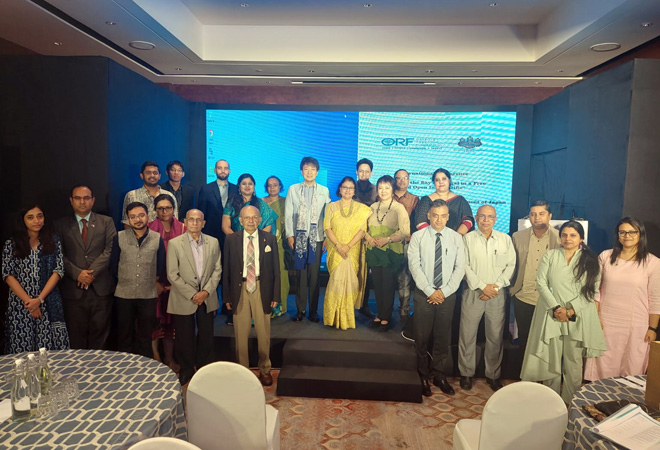
After a dynamic discussion on security, the afternoon was devoted to the last and fourth business session of the conference on “Blue economy in the Bay of Bengal: Riding the waves of sustainability,” chaired by Punyashlok Bhaduri, Professor, Department of Biological Sciences, Indian Institute of Science Education and Research, India. The special address was delivered by Yoji Natori, Associate Professor, Faculty of International Liberal Arts, Global Studies Program, Akita International, University, Japan. The speakers were Katharina Bothe, Deputy Head of Program, “Seafaring and Society”, Research Fellow, German Maritime Museum, Germany; Aparna Roy, Fellow and Lead, Climate Change and Energy, Centre for New Economic Diplomacy, ORF, India; Vijay Sakhuja, Director, School of Integrated Coastal and Maritime Security Studies, Rashtriya Raksha University, India; and Mahua Saha, Principal Scientist, Chemical Oceanography, National Institute of Oceanography, India. The deliberations highlighted that the Bay of Bengal region is home to nearly 1.4 billion people of which many are dependent on the sea for their livelihood. As such, the countries are also dependent largely on the oceans for their food security and economic prosperity. The cultivation of Blue Economy for the sustainable use of the Bay of Bengal ecosystem is thus necessary. However, Blue Economy faces numerous challenges due to climate change, depletion of natural resources, and competing interests in the regional seas. Thus, improved collaboration amongst nations and even the private sector is necessary. Engagement is also needed between the local businesses and their respective governments to localise the idea of sustainability. As a way forward, five crucial areas need to be focused on for implementing Blue Economy in the Bay. These are harnessing maritime renewable energy, decarbonizing shipping, protecting the coastal ecosystem, investing in sustainable fishing, and in sustainable tourism.
In his concluding address, Harsh Pant, highlighted that in all the business sessions, cooperation amongst Bay littorals and the stakeholder major powers has emerged as a response for a stable future of the Bay. Interestingly, the necessity of engaging China through dialogues in various developmental initiatives has also been pointed out. While India must also engage more proactively in the Bay, Japan must ponder on how it can have a more sustainable role in the Bay of Bengal region, where it is already engaged in multiple sectors across the littoral countries. In time, Japan’s role in the region can also become a template for others to follow.
This event report has been compiled by Sohini Bose, Junior Fellow, ORF Kolkata with the help of Debosmita Sarkar, Junior Fellow, ORF Kolkata and Soumi Biswas and Monika Ahlawat, Research Interns at ORF, Kolkata.
The views expressed above belong to the author(s). ORF research and analyses now available on Telegram! Click here to access our curated content — blogs, longforms and interviews.



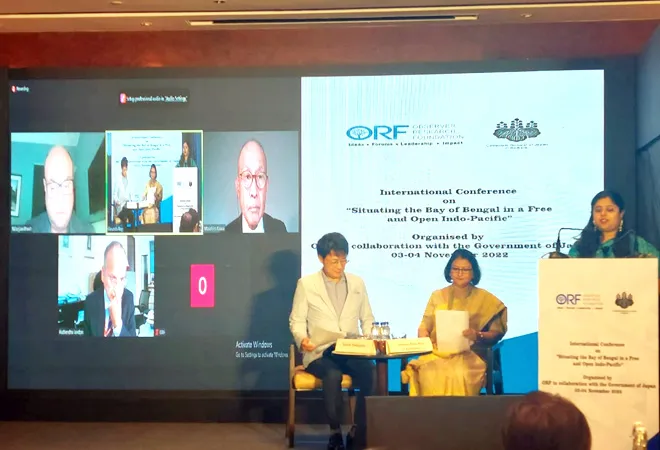





 PREV
PREV

